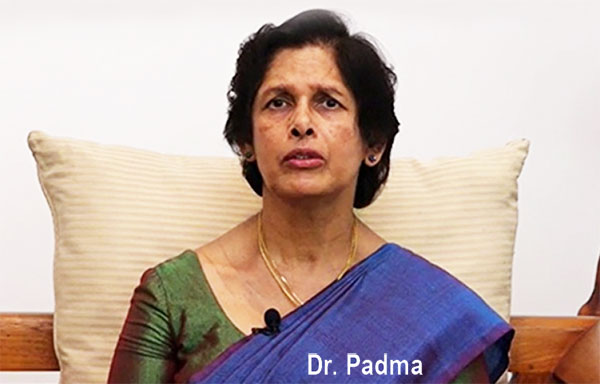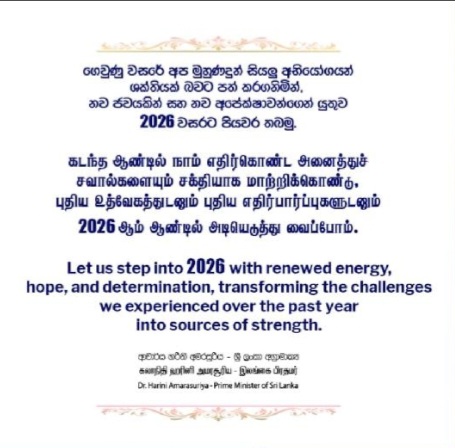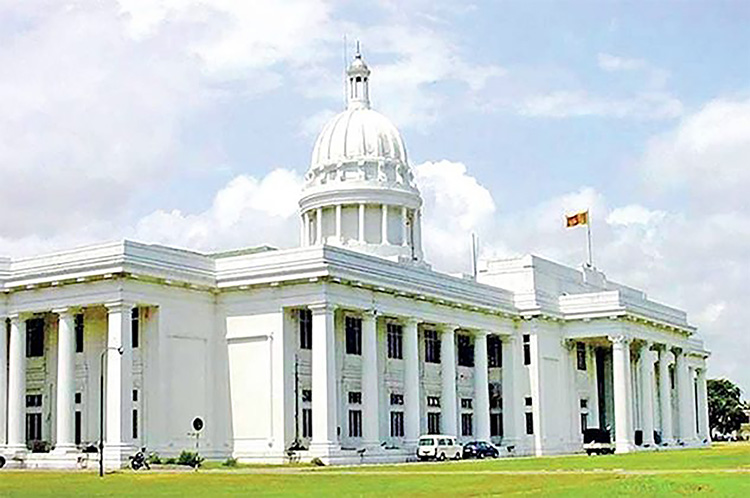News
All vaccines reduce death and hospitalisation – SLMA

The Sri Lanka Medical Association on Thursday (09) said that all vaccines reduced death and hospitalisation, and some fully-vaccinated people could get reinfected they will mostly develop mild symptoms such as fever, cough, etc.
The SLMC said that Sri Lanka had relied on vaccination and movement restriction to control the Covid-19 epidemic and that all vaccines approved so far by the NMRA had saved many lives and prevented severe disease. Most people who have died from COVID are unvaccinated individuals. It is therefore essential that all unvaccinated people, over the age of 18 years be immunised, with any of the available vaccines at earliest possible, SLMA President, Dr. Padma Gunaratne said.
“Subject to above recommendation, the SLMA has formulated recommendations further based on scientific principles with an objective of preventing severe disease and deaths. Preventing severe disease will reduce congestion in hospitals and ICU, and will indirectly benefit people with other diseases who also need ICU facilities,” she said.
The SLMA has issued a media statement: “With the roll out of the vaccines, certain characteristics that are specific for the type of the vaccines have been identified. Especially with the Delta variant, while all vaccines reduce death and hospitalization, fully vaccinated people can be infected and develop mild symptoms, such as fever, cough, etc. However, studies have revealed that a minority of fully vaccinated people can get severe disease, and may even die. Studies from Bahrain has shown that in those over 50 years, people given the Sinopharm vaccine, while preventing death and severe disease compared to the unvaccinated, had a slightly increased death rate, and’ hospitalisation compared to the Pfizer, Moderna, Sputnik and AstraZeneca vaccines. Studies from the laboratory of the Department of Immunology and Molecular Medicine, Sri Jayewardenepura University (SJPU) has shown that, while almost all people over 60 years given the AZ vaccine develop antibodies, a very small proportion, 7%, given Sinopharm do not do so. In addition, patients with some diseases or on certain drugs (organ and stem cell (bone marrow) transplant recipients, patients with active cancer, those on immunosuppressive therapies and on dialysis, advanced HIV have a weak immune system, and will not produce antibodies, whatever the vaccine that was given.
“1. For this reason, we propose that people over 60 who had been given two doses of Sinopharm, and those with a weak immune system, be given a third dose, with AZ, Pfizer or Moderna vaccines. The study from Bahrain and data from SJPU indicate that people below 60 years produce a robust immune response to Sinopharm, and are protected from death or severe disease.
“2. We therefore recommend that all people (without the diseases mentioned above) are given two doses of Sinopharm. Children from 12 — 18 years generally do not get severe disease. However, children with certain underlying diseases may get severe disease. We therefore recommend two doses of Pfizer for this group. Some people have been administered one dose of Sputnik; the second dose is different from the first. If the second dose is not available.We suggest that a single dose of AZ, Pfizer or Moderna be given instead.
“Studies in the UK and the US have shown, that, with AZ, Pfizer and Moderna, protection (effectiveness) against severe disease and death is maintained for at least six months.
We therefore suggest that, as there may be a waning of immunity with time, a booster dose of the same or a different vaccine, be given to people over 60 years, who had been given two doses of AZ, at least 6 months after the second dose. Studies have shown that immunity is boosted, with this regimen.”
Latest News
I invite you to step into 2026 with renewed energy, hope, and determination – PM

Prime Minister Dr Harini Amarasuriya in her New Year message invited all Sri Lankans to step into 2026 with renewed energy, hope, and determination.
The PM’s New Year message:
“As we move forward to the New Year of 2026, it is timely to reflect on the year 2025 that has passed. The year 2025 can be granted as a year having made a number of decisive and progressive steps with a people oriented government.
I am confident that, within a new political culture, we were able to strengthen transparency in state governance and lay the foundation for an efficient and corruption free public service.
We can be satisfied with the progress achieved in several key areas during 2025, including economic stability, the increasingly positive and optimistic international perception towards our country, the establishment of transparent systems of governance, and the strengthening of the sovereignty of the legislation system.
However, the unfortunate disastrous situation we experienced towards the end of 2025 was a challenging period for our nation. While it deeply moved us all, the spirit of solidarity, compassion, and collectivity shown by Sri Lankans during that difficult situation received admiration across the world.
As we step into the New Year 2026, we hold commitment to overcoming those challenges, healing from the disaster, and restoring the lives and livelihoods that were affected.
Moving forward with the goals such as initiating qualitative and sustainable transformation in the education sector, digitalizing all sectors of the public service, creating an enabling environment for entrepreneurs, artists, and creators with innovative ideas to rise on the global stage, and building a compassionate, environmentally friendly society free from drugs and harmful substances I would like to remind, at this moment, that the responsibility of rebuilding this nation rests upon the entire nation, together with the government, transcending differences of ethnicity, religion, or political affiliation, and united by a strong Sri Lankan identity.
Transforming all the challenges we experienced in the past year into sources of strength, I invite you to step into 2026 with renewed energy, hope, and determination.
I extend wishes for a victorious New Year filled with peace, happiness, and prosperity.”
News
National Audit Office reveals NHSL lapses

Reagent scandal:
Deputy Director of the National Hospital, Dr. Rukshan Bellana, has been interdicted by Health Service Committee (HSC) of the Public Service Commission (PSC) following a preliminary inquiry into several complaints received against him, government sources said.
They said certain matters referred by the Secretary to the Prime Minister Dr. Harini Amarasuriya and Inspector General of Police (IGP) Priyantha Weerasooriya, too, had been taken into consideration.
A Health Ministry official said there was no truth in Dr. Bellana’s claim, as reported in the 30th December edition of The Island, that the Health Ministry had sacked him on the approval of the HSC of the PSC over him taking up the massive Rs 900 mn fraud involving the supply of chemical reagents to the laboratory of the National Hospital of Sri Lanka (NHSL) in Colombo, which is the premier hospital in the country.
Sources said that there was absolutely no basis for this allegation. The official said that Dr. Bellana had been interdicted for issuing statements that caused controversy and turmoil among the public. That’s the most serious offence that had been taken into consideration when the decision to interdict him was taken, sources said. “There will be a spate of charges in the charge sheet to be issued soon.”
The interdiction of medical officers could not be carried out by the Ministry of Health and Mass Media, as the Ministry was not vested with disciplinary authority, sources added.
Dr. Bellana said he stood by what he revealed and had evidence to support his claim.
Health Ministry sources acknowledged that the National Audit Office (NAO) on June 6, 2025, had called for information in respect of chemical reagents procured by the National Hospital Colombo NHSL laboratory from 2022 to 2024.
Responding to another query, sources said that a separate investigation by the Internal Audit of the Ministry of Health was on into issues raised by the Audit query pertaining to the lab of the NHSL.
Having pointed out that the government paid Rs. 894,186,168 (2022), Rs. 713,652,615 (2023) and Rs. 936,152,767, totalling Rs 2,543,991,550 for chemical reagents during that period, NAO sought an explanation from the Health Ministry as to how Rs 12,894,697 worth of chemical reagents past expiry dates were found in six laboratories at NHSL during examination carried out on April 7,8,10,21 and 22 in 2025.
The NAO also raised the failure on the part of the relevant authorities to secure the approval of the Medical Supplies Division (MSD) before placing orders with local suppliers for chemical reagents.
The Health Ministry was questioned over the absence of proper stock keeping regarding Rs 2544 mn worth chemical reagents issued to NHSL laboratories. The NAO ascertained that Financial Regulations 751 had been violated. As a result of the absence of credible stock keeping, the NAO hadn’t been able to ascertain whether shelf-life expired chemical reagents were misused, the government authority stated.
The NAO asked for an explanation regarding the payment of Rs 912,838 over the required amount to a local private supplier (NAO named the supplier) for chemical reagents obtained.
In one of the most serious observations, NAO pointed out that shelf-life expired chemical reagents had been used for tests. The NAO raised this while pointing out the Health Ministry violated a key prerequisite in the procurement of chemical reagents that their shelf life should be at least 85% at the time of receiving consignments. Instead, all stocks procured had less than six months shelf life, NAO stated.
NAO declared that some suppliers refrained from mentioning the date of manufacture and the time of expiry.
The above mentioned were some of the issues that had been raised by Audit Superintendent Y.M. Sugathadasa on behalf of the Auditor General who is the head of the NAO. The post of AG remains vacant since December 8, 2025. Earlier incumbent W.P.C. Wickremeratne retired on April 8, 2025 after having served as AG for several years. President Anura Kumara Dissanayake and the Constitutional Council haven’t been able to reach consensus on a permanent appointment yet.
By Shamindra Ferdinando ✍️
News
NPP’s CMC budget passed after four Opp. members switch allegiance

The Opposition has claimed that the government forced three of its Colombo Municipal Council members to to skip yesterday’s vote on the annual budget of the Council. The three councillors who voted with the SJB-led Opposition on 22 Dec., to defeat the NPP, skipped yesterday’s vote.
Two of them didn’t turn up yesterday while the other one left the Council early, claiming his wife was not well. One of the four SLMC councillors switched his allegiance to the NPP. having voted with the Opposition on 22 Dec.
As a result, the CMC’s annual budget was passed with a majority of two votes.
The budget proposal received 58 votes in favour, while 56 councillors voted against it. Last week, the Opposition obtained 60 votes to defeat it, while the NPP managed to secure only 57.
When the 2026 budget of CMC was first presented to the council on 22 December, 60 councilors voted against it while 57 members voted for the budget.
In the last Local Government Elections, the NPP secured power in the CMC and its mayoral candidate Vraie Cally Balthazar was elected as the Mayor of Colombo by securing 61 votes. (SF)
-

 News6 days ago
News6 days agoStreet vendors banned from Kandy City
-

 Sports3 days ago
Sports3 days agoGurusinha’s Boxing Day hundred celebrated in Melbourne
-

 News6 days ago
News6 days agoLankan aircrew fly daring UN Medevac in hostile conditions in Africa
-

 News1 day ago
News1 day agoLeading the Nation’s Connectivity Recovery Amid Unprecedented Challenges
-

 Sports4 days ago
Sports4 days agoTime to close the Dickwella chapter
-

 Features6 days ago
Features6 days agoRethinking post-disaster urban planning: Lessons from Peradeniya
-

 Opinion6 days ago
Opinion6 days agoAre we reading the sky wrong?
-

 Features2 days ago
Features2 days agoIt’s all over for Maxi Rozairo













